

Four Conceptions of the Heroic. Four Conceptions of the Heroic by Vera Norman Adapted from a presentation given at the February 2003 FORum.
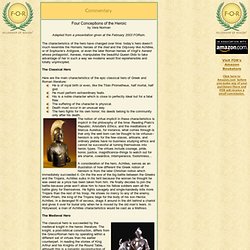
The characteristics of the hero have changed over time: today’s hero doesn’t much resemble the Homeric heroes of the Iliad and the Odyssey like Achilles, or of Sophocle’s Antigone, or even the later Roman heroes of Virgil’s Aeneid whose protagonist, Aeneas, manipulates the beautiful Queen Dido to take advantage of her in such a way we moderns would find reprehensible and totally unprincipled. Heroes: What They Do & Why We Need Them. By Scott T.
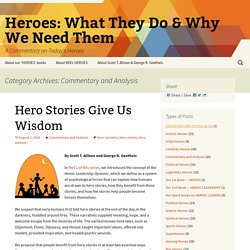
Allison and George R. Goethals In Part 1 of this series, we introduced the concept of the Heroic Leadership Dynamic, which we define as a system of psychological forces that can explain how humans are drawn to hero stories, how they benefit from these stories, and how the stories help people become heroes themselves. We suspect that early humans first told hero stories at the end of the day, in the darkness, huddled around fires. These narratives supplied meaning, hope, and a welcome escape from the miseries of life. We propose that people benefit from hero stories in at least two essential ways. Theologian Richard Rohr argues that hero stories encourage people to think transrationally about ideas that seem to defy rational analysis.
Hero stories reveal truths and life patterns that our limited minds have trouble understanding using our best logic or rational thought. The Hero Archetype in Literature, Religion, Movies, and Popular Culture: A Graduate Project. The Hero Archetype in Literature, Religion, Movies, and Popular Culture: A Graduate Project. Heros_journey.
Heroes: What They Do & Why We Need Them. The Hero Archetype in Literature, Religion, Movies, and Popular Culture: A Graduate Project. Heroes: What They Do & Why We Need Them. By Scott T.
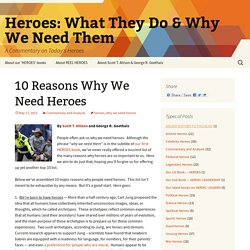
Allison and George R. Goethals People often ask us why we need heroes. Although the phrase “why we need them” is in the subtitle of our first HEROES book, we’ve never really offered a succinct list of the many reasons why heroes are so important to us. Here we aim to do just that, hoping you’ll forgive us for offering up yet another top-10 list. Below we’ve assembled 10 major reasons why people need heroes. 1. 2. When we recognize the great sacrifices that these nurturers and caretakers have made for us, we’re likely to call them our heroes. 3. 4. 5. Heroes lift us up when we’re personally in danger of falling down emotionally, physically, or spiritually. 6. 7. 8. Hunger for hero stories and take great delight in building celebrity heroes up and then tearing them down. 9. 10. So there you have them – 10 reasons why people need heroes. What makes a hero? - Matthew Winkler. The Hero Archetype in Literature, Religion, and Popular Culture: (along with a useful PowerPoint presentation teachers can download at this URL: )Maricopa Center for Learning and Instruction (users embark on their own hero's journey): American Masters Lesson from PBS for Teachers on George Lucas, the Power of Myth, and the Hero's Journey: an interactive approach to the Hero's Journey: of course, information about Joseph Campbell's works on the subject, on the Joseph Campbell Foundation site:The Hero With A Thousand Faces Hero's Journey (semi-biographical film): the stories of (a) Odin hanging from the world tree, Yggdrasil, (b) the Buddha seated under the Bodhi Tree, and (c) the crucifixion of Jesus Christ.
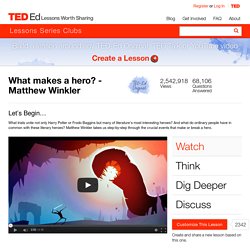
Do all of these religious episodes follow the pattern of the hero’s journey? Find a comparable story from another continent. Problématiques mythes et héros. Voici quelques exemples de problématiques Mythes et Héros pour présenter la notion au bac d’anglais.
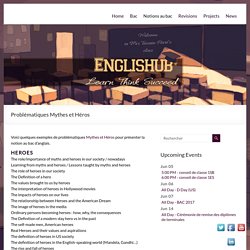
Pour savoir comment présenter ces problématiques Mythes et héros à l’oral d’anglais, suivre ce lien. Pour revoir la méthode pour l’oral du bac d’anglais, passez par là. Pour plus d’information sur la notion Mythes et héros elle-même, c’est par ici. ANGLAIS - Programmes du cycle terminal : <br/>Mythes et héros - problématiques et ressources.